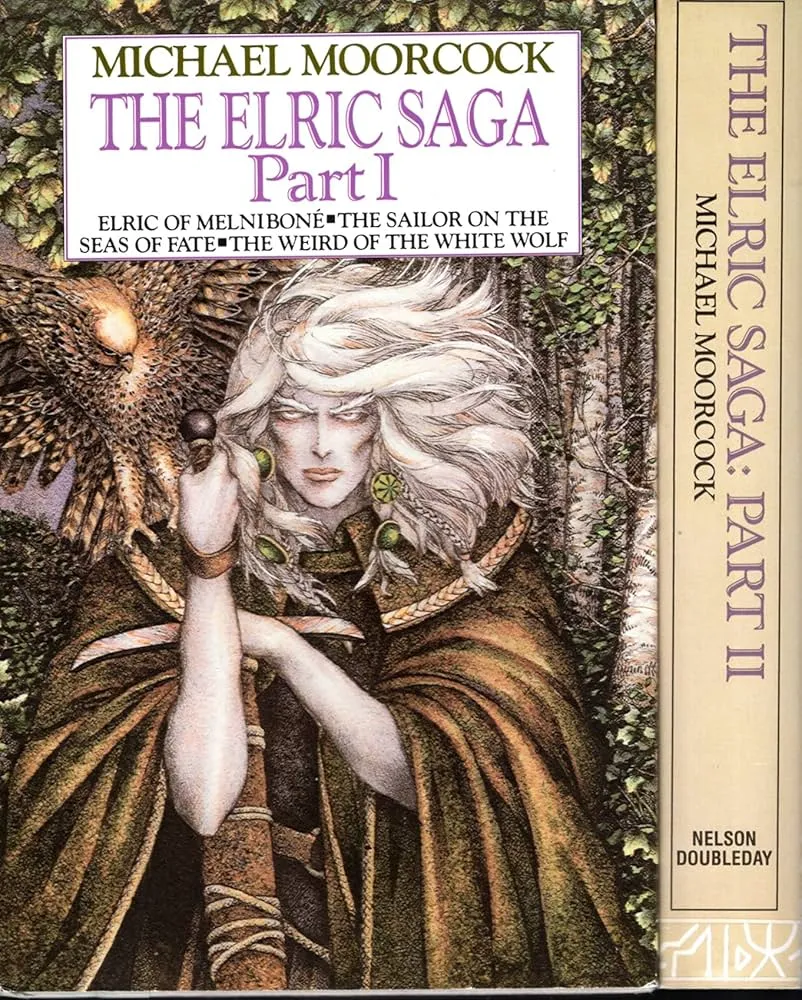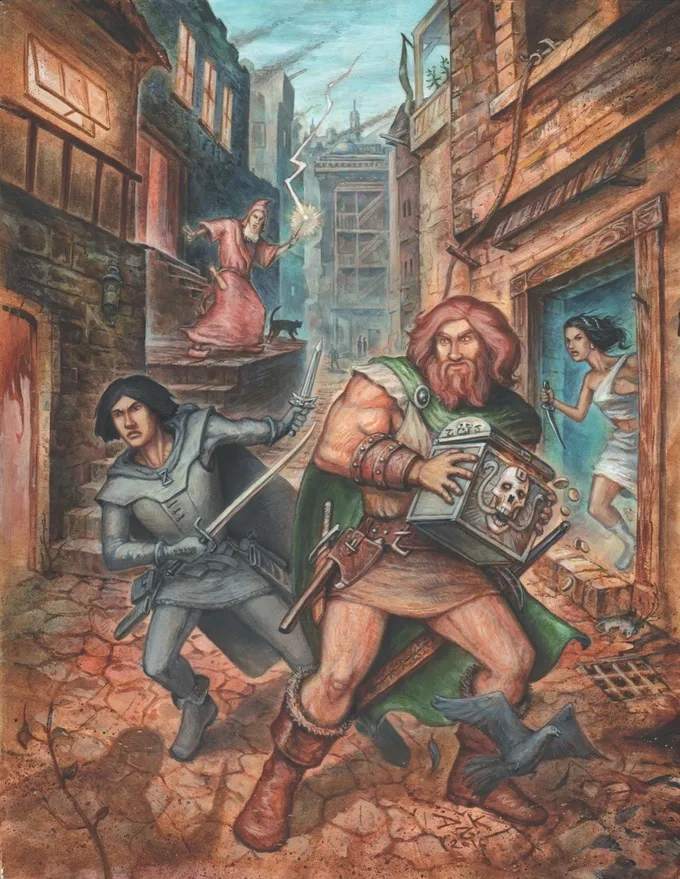Dipping my toes into Appendix N
I recently started to listen to two audiobooks simultaneously. I’m not a big audiobook guy, but I am starting to see the value in listening to a story, vs having to use my eyes to read it. Some nights I’m just tired and my eyelids can’t stay open, let alone keep track of where I am on the page. Other times I am in a car, train or plane and the movement makes reading dizzying.
The best thing about it is that I can listen to an audiobook and do something else in the meantime. It just frees up my hands so I can do something other than reading while reading.
Anyway, I wanted to see what all the fuss was about when it came to Appendix N. It seems like a lot of the media I enjoy stems from this canon of literature (which it almost certainly would not be deemed by the gatekeepers of publishing). These are some of the bedrocks of genre fiction. Much like how Stephen King defined modern American horror fiction, these books defined an era of fantasy. In many ways, they were examples of counter-programming that eschewed much of the tropes that were left to fester in the wake of Tolkein. Instead, these stories were linked via their own set of conventions, especially in the Sword and Sorcery space.
Elric
 I like Conan. I think he’s cool. Saw the film, never read the books. I would probably read some of Howard’s short stories to get a feel, but I did not want to start in the obvious place. That’s just a “me” thing.
I like Conan. I think he’s cool. Saw the film, never read the books. I would probably read some of Howard’s short stories to get a feel, but I did not want to start in the obvious place. That’s just a “me” thing.
Like a true Alt-Boy, I started with Elric.
I am quite a ways into the audiobook on Spotify and I gotta say, whoever this narrator is, they need A) a raise B) to be cast in everything. This guy fucking rules. He gets it. Not only did he nail Elic’s voice, he knew what voice this world needed, maybe even better than Moorcock’s writing.
As a small tangent as well, I think the foreword by Niel Gaiman might be one of the best things he has ever written. It completely contextualizes the entire experience of the audiobook in a way that may not be ideal for those who want to go in blind, but I think it really helped put me in the right mind-set. Imagine yourself as an unpopular kid in a British boarding school (not hard for me) and yearning to break out of such a rigid and often miserable environment. Your only escape is through books of fantasy, and here comes Elric, the psychedelic mutant with the power to save or destroy the multiverse.
Side note: I know Gaiman’s in the midst of a scandal, but there is no avoiding the guy when it comes to fantasy literature. He practically writes the foreword to everything and his writing has been foundational to my own creative output. I am personally able to enjoy his writing for what it is. I do not think it exempts him from any hurt he has caused.
Honestly the narration carries this story for me. Moorcock’s writing can be incredibly evocative and sensory. He’s asking a lot of your imagination in the weird environments and characters he presents at a mile a minute. There is no “normal” in this multiverse. We start in the place called the Dreaming City of Imrryr (Destiny reference?) and things only get weirder from there.
Elric himself is weird. He begins as a weak and disinterested emperor that is kept alive and well through copious drug use. For me, the best parts of this saga are the ones that interrogate Elric’s relationship with Stormbringer, the ancient and powerful black sword, which becomes his new drug. The sword itself has a mind and agenda of its own, which begs the question who is really driving this story? Elric? Or Stormbringer?
I’ll also say that I enjoy the concept of Patrons that this story introduces, which has become a huge staple of DND and its offshoots. Arioc gives Elric power and guidance, but always at a cost. Arioc is a lord of chaos, and in dealing with him, Elric has aligned himself with that cosmic force, cementing his place in a battle that is far bigger than his world, but one that stretches across every reality.
Frankly the scope of what Moorcock created is truly epic. The story goes places, never content to languish in the same spot for too long. In a way, it can feel schizophrenic. I do think the story suffers when the tone gets too goofy, like Moorcock was on laughing gas when he wrote some of it. There are characters that come across as cartoonish, or just plain silly, which is jarring when the rest of the story has such an earnest and grandiose tone.
Then again, it is that spirit of genre-mashing and just going for it that I really like about this series. It isn’t afraid to throw out the rule-book and experiment. It has faith that the reader is able to follow along (maybe to its detriment) no matter how crazy the plot gets.
Still, it could benefit from a more deliberate pace and consistent tone. I am currently in the chapter where Elric and Oona are in the dream realms and while that part of the book goes all out on psychedelia, it feels like a weak point. The world doesn’t have any more rules, and we’ve been stuck on this side-quest for a while now.
Lankhmar
 The second audiobook I have been listening to simultaneously is Swords of Lankhmar by Fritz Leiber. Not gonna lie, I only know about this series because of the DCC supplement, which has such an affection for its source material that it was hard for me not to give some of it a read.
The second audiobook I have been listening to simultaneously is Swords of Lankhmar by Fritz Leiber. Not gonna lie, I only know about this series because of the DCC supplement, which has such an affection for its source material that it was hard for me not to give some of it a read.
This is a much lighter read than Elric. It is not to say that the story doesn’t have stakes, but it is not at all concerned with Law vs Chaos or any such cosmic conflict. Instead it is a great example of low-fantasy. We are following human characters, with extraordinary abilities, who nonetheless have human desires and impulses. These are not knights in shining armour but puckish rogues who take every day in stride.
Fafhrd and the Gray Mouser are fun characters. They may not be the most compelling protagonists, even in fantasy fiction (Fafhrd is no Logan Nine-fingers) but they are charming and entertaining. That’s my take on these novels. They are comfort reads. Gaiman also does the foreword to this audiobook (though this time it is actually him reading) and honestly it does not seem like he has the same affection for this that he so clearly shows in his foreword to Elric Saga. That’s fair. Basically what he says in that foreword is that this is a comfort read. He’s right.
While the narrator here doesn’t go as hard as the Elric guy, he does a great job nonetheless and has a cozy quality to his voice that further pushes the vibe that this is some yarn spun by the fireplace. The events of this book feel slight in comparison to the Elric saga, but that does make for a nice palette cleanser. The mental load is far reduced here. Elric is not a particularly complicated book, but this is as straightforward as it gets.
Swords of Lankhmar is a fantasy mystery story. It has fairy tale elements without any moralizing or fable to it. The world of Nehwon is well realized and more importantly it is human. It is driven by human motivation and human desire. The characters are corporeal. They have bodily functions. They feast, fight and fuck basically.
There are gods here, but they are not all-powerful nor omnipresent. Instead, the real movers and shakers of this world are much the same as in ours. We may not have wizards, but we have tech billionaires. We have politicians. We have brokers. Magnates. Oligarchs. These all exist in Nehwon, and nowhere more so than in Lankhmar.
So yeah, Lankhmar is comfortingly familiar. It has a beating heart.
It has its weirdness for sure. Nehwon is supposed to be a bubble floating in space. You have German wizards tearing through the fabric of reality. It’s still a fantasy novel, but again, it’s not like this is all being driven by Lords of Chaos and Law. Fafhrd and the Gray Mouser are agents of their own fate. They make bad decisions but they own them.
In many ways, it feels like Spaghetti Fantasy. Not in that it is remotely Italian (this is the most American feeling fantasy novel I’ve read) but in that it has a very episodic structure. Swords of Lankhmar doesn’t really carry over a lot of plot threads from prior adventures, or at the very least they were not obvious callbacks. It felt like watching The Good the Bad and the Ugly before A Fistful of Dollars, it just didn’t matter that much.
The adventure itself also leans full tilt into pulp. I would not call it gonzo (Elric has more of that) but it is not terribly far removed. It’s whimsical without being twee.
Wrapup
I think as a first taste of both series I am enjoying what they have to offer quite a bit. I don’t think they stand with the heights of what this genre has achieved from either a character or narrative level. Like none of them are on the same level as Earthsea, but comparison is the thief of joy and it's worth remembering that both these series were written to be episodic.
That’s probably a big reason why they actually feel like DND adventures. The quest format seems to come directly from this form of storytelling, which favors short, self-contained stories that have some light continuity across the series. There isn’t that grand narrative structure or thoughtfully charted character arcs that you might get from a modern fantasy novel. This actually makes them very easy to pick up, put down and pick back up again at your leisure. In fact, I’d say they are damn good sources of inspiration for adventure gaming as a result.
#Books #Games